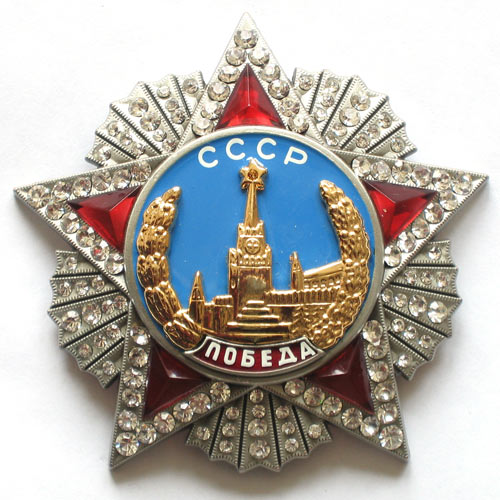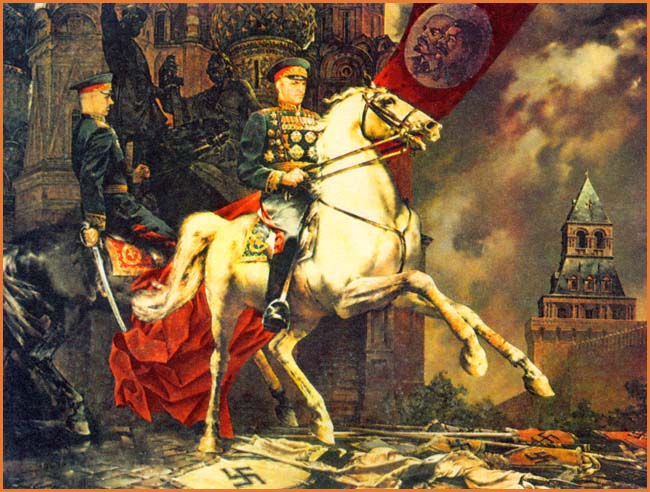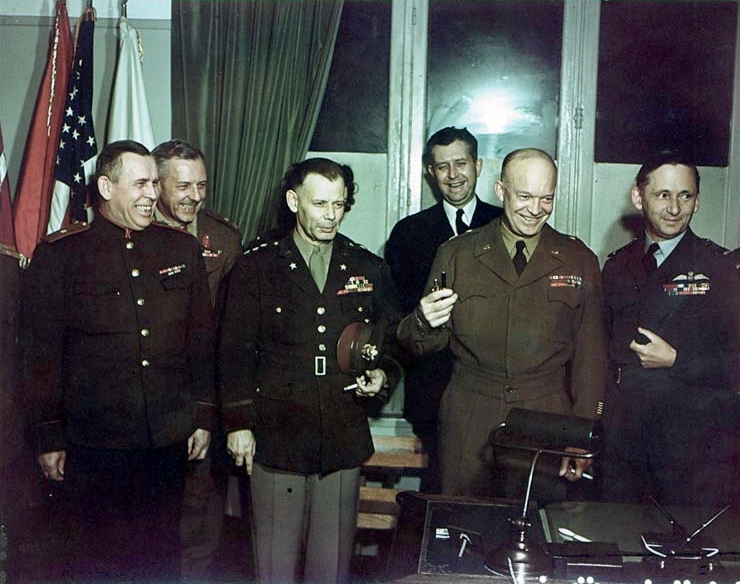
(Order of Victory of the Union of Soviet Socialist Republics.)
The Victors poured into the streets of Paris and Athens last night. It is a sort of Victory in Europe Day for the forces of progressive anti-austerity. You saw the headlines this morning: Francois Hollande edged Nicolas Sarkozy to become the first Socialist President since the days of patrician Francois Mitterand. Greek voters lurched to the far left as a rejection of the two main parties that had endorsed German Chancellor Merkel’s tough fiscal love in exchange for continued bail-outs.
If you know how this is going to work out, more power to you. But the symbolism of this day- and its controversy- made me think about Wednesday, when I am inviting my Russian friends to join me at Willow for a celebration of the real Victory Day. There is some confusion on that score, propagated to some degree by the exigencies of the Cold War, and the harsh nature of total war against civilian populations.
You can blame the Germans for a lot of things, but once Hitler was dead, you can certainly understand why Grand Admiral Karl Doenitz, the Fuhrer’s designated successor, wanted to surrender to the Allies. He did so on May 7th, 1945, in the little red schoolhouse that Dwight Eisenhower, Supreme Allied Commander, was using as his headquarters in Reims, France.
The way the ceremony was treated in the New York Times reflected the formal end of the war in Europe after “five years, eight months and six days of bloodshed and destruction.”
Colonel-General Gustav Jodl inked the unconditional surrender for the Reich. His was the second highest general officer rank—below only that of Field Marshall.
The Allies were represented by three-star officer, Lieutenant General Walter Bedell Smith, Chief of Staff for General Eisenhower. It was also signed by General Ivan Susloparoff for the Soviet Union and by Gen. Francois Sevez for France.
General Eisenhower could not make it for the signing, which is sort of odd, considering the magnitude of the enterprise which was being brought to a conclusion, and probably reflects the uncertainty about how to not upstage the successful entry of the Red Army into Berlin, where the fires in the Reichstag still smoldered.
Ike did receive Jodl and his fellow delegate, General-Admiral Hans Georg Friedeburg, immediately after the signing, and he pointedly asked them if they understood precisely the terms to which they had agreed.
The Germans said “Jawohl,” and that would have been that in a rational world, but this is not one of those. The Red Army liaison officer to SHAEF was in a bit of a pickle. He had no instructions from the Kremlin, though he understood full well the nature of the sacrifice in blood his Motherland had given to enable the triumph over the Hitlerites. The surrender, by his reasoning, should naturally be to Marshall Zhukov, on behalf of Uncle Joe Stalin, in the capital of the hated Germans.

(Marshall Zhukov and his white charger trample the battle flags of the Reich. Marshal Rokossovsky of the 2nd Belorussian Front is behind him on the dark horse. Vic has the poster of this image from the Victory Day celebration in Moscow in 1998.)
Zhukov had led the 1st Belorussian Front through the last formations of German resistance: the defense of the capital consisted of several disorganized Wehrmacht and Waffen-SS Divisions, augmented by aged Volkssturm and Hitler Youth formations. The last hold-outs in the ruined Reichstag included foreign SS volunteers who had nothing left to lose.
Berlin’s defenders finally gave it up on the 2nd of May, though sporadic fighting continued to the west of the city as German units fought to break out to the Rhine and surrender to the Allies, rather than the Red Army.
After having signed the full surrender, General Jodl said he wanted to speak and was permitted to do so. “With this signature,” he said “the German people and armed forces are for better or worse delivered into the victors’ hands.”
General Ivan Susloparoff was faced with the worst choice a Soviet officer could confront: the possibility of incorrect thinking. If he did not sign the surrender, the Soviet Union would not be represented in what could be the unconditional end of the Great Patriotic War. If he did, he stood the real risk of incurring the wrath of Stalin.
That was not a good thing, and Uncle Joe was indeed seriously peeved at the surrender in France, which was an affront to the colossal cost his people had borne. As Susloparov returned to his office to report to Moscow, he saw a freshly arrived order not to sign the document.
Crap. You can imagine what he must have thought.
All’s fair in Love and Peace, though, and the goal posts were moved by the Kremlin. The Soviet Government announced that the Rheims surrender was “preliminary,” and demanded a second surrender ceremony. It was arranged at the former German officer’s mess at Karlshorst, in Berlin, late on May 8, or early on the 9th, Moscow time.
General Susloparov was there, and he got to see the senior representatives of the German forces capitulate to Marshall Zhukov: Colonel-General Hans-Jurgen Stumpff for the Luftwaffe, Field Marshall Wilhelm Keitel of the Wehrmacht, and Admiral Hans-George von Friedenburg of the Kriegsmarine.

(Allied Commanders at the “preliminary” surrender at Rheims. Soviet General Susloparov is at left, and smiling until he got back to his office.)
General Susloparov was lucky. He was not disappeared or made a non-person in the victorious Soviet Union for his misdeed. He was assigned to head the Military Diplomatic Academy in Moscow until retirement, and was the officer in charge of the Cadet Corps. He died in 1974, and is buried in Vvedenskoye Cemetary.
Here is how Uncle Joe summed things up in his proclamation on the real Victory Day:
Moscow, May 9, 1945
Comrades!
Fellow countrymen and countrywomen! The great day of victory over Germany has arrived. Fascist Germany, forced to her knees by the Red Army and the troops of our Allies, has admitted defeat and has announced her unconditional surrender.
On May 7 a preliminary act of surrender was signed in Rheims. On May 8, in Berlin, representatives of the German High Command, in the presence of representatives of the Supreme Command of the Allied troops and of the Supreme Command of the Soviet troops, signed the final act of surrender, which came into effect at 24 hours on May 8.
Knowing the wolfish habits of the German rulers who regard treaties and agreements as scraps of paper, we have no grounds for accepting their word. Nevertheless, this morning, the German troops, in conformity with the act of surrender, began en masse to lay down their arms and surrender to our troops. This is not a scrap of paper. It is the actual capitulation of the armed forces of Germany… We now have full grounds for saying that the historic day of the final defeat of Germany, the day of our people’s great victory over German imperialism, has arrived.
The great sacrifices we have made for the freedom and independence of our country, the incalculable privation and suffering our people have endured during the war, our intense labors in the rear and at the front, laid at the altar of our motherland, have not been in vain; they have been crowned by complete victory over the enemy. The ago-long struggle of the Slavonic peoples for their existence and independence has ended in victory over the German aggressors and German tyranny.
Henceforth, the great banner of the freedom of the peoples and peace between the peoples will fly over Europe Comrades! Our Great Patriotic War has terminated in our complete victory. The period of war in Europe has closed. A period of peaceful development has been ushered in. Congratulations on our victory, my dear fellow countrymen and countrywomen!
Glory to our heroic Red Army, which upheld the independence of our country and achieved victory over the enemy!
Glory to our great people, the Victor people!
Eternal glory to the heroes who fell fighting the enemy and who gave their lives for the freedom and happiness of our people!”
So that is why we will be celebrating Victory Day on Wednesday at Willow with our Russian friends. The 9th of May will forever be Victory Day for the Russians, and that is just the way it is going to be. We can have VE day whenever we want. They know the real one.
As to those claiming victory in Europe this morning, I hope we eventually figure out exactly what this all means. It certainly won’t be by Wednesday.
Copyright 2012 Vic Socotra
www.vicsocotra.com
